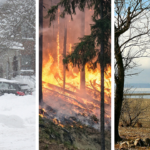 With support from the University of California, the State of California, the National Institute of Food and Agriculture, The US Department of Labor, and in collaboration with local economic development actors, business leaders, and the California Coastal Commission, this area of work seeks to articulate the relationship between economic resiliency, climate change, natural disasters, and economic change and sustainable economic development at the local and regional level. These include demonstration and applied research projects done in collaboration with local and state actors to support local economic development and job creation. On a purely academic side this work utilizes large quantitative data analyses of national level data alongside in-depth ethnographic case studies of local economies in the US to identify the social, economic and political characteristics that promote the resilience of local economies to natural disasters.
With support from the University of California, the State of California, the National Institute of Food and Agriculture, The US Department of Labor, and in collaboration with local economic development actors, business leaders, and the California Coastal Commission, this area of work seeks to articulate the relationship between economic resiliency, climate change, natural disasters, and economic change and sustainable economic development at the local and regional level. These include demonstration and applied research projects done in collaboration with local and state actors to support local economic development and job creation. On a purely academic side this work utilizes large quantitative data analyses of national level data alongside in-depth ethnographic case studies of local economies in the US to identify the social, economic and political characteristics that promote the resilience of local economies to natural disasters.
Questions surrounding what constitutes resilience to natural disasters, the sensitivity of local economies to natural shocks presented by these events, longer term effects of climate change and the ability of local systems to react to and restore an acceptable level of growth in the in the face of these have become commonplace in the social sciences. Scholarship in this area has focused on developing theoretical frameworks of “resilience”- with research concentrated on narrowing the boundaries and definitions of resilience in the context of unexpected economic shocks. However, theories on what constitutes economic resilience in the context of natural disasters varies. This comprehensive body of work seeks to understand the social, economic, and political characteristics that promote adaptive resilience of local economies to natural shocks (the direct and indirect costs associated with natural disasters and emergencies such as wildfires, droughts, and epidemics) and will excavate how adaptive resilience influences long-term local economic development and growth.
The project is positioned to contribute to the literature in three primary ways:
- Advances understanding of adaptive resilience by advancing two new measurements of resilience and recovery in local economies after natural disasters
- Provides an examination of economic resilience and recovery to natural shocks at the local level
- Links resilience and recovery outcomes with characteristics of economic resilience across multiple scales.
- Identifies, supports, and helps to extend new and existing economic development initiatives that support large scale local and regional job creation.
Related Publications and Projects:
California Sustainable Blue Economy Initiative: https://www.opc.ca.gov/programs-summary/sustainable-blue-economy/ (coming soon)
California Commission for the Rehabilitation of Clear Lake (AB 707): https://clearlake.ucdavis.edu/
Visser, M.A. C.E. Cannon, and L. Panyanouvong. (2021). Strategies for Recovery from Natural Disasters in Indian Country: A view from California. California Blue Ribbon Committee for the Rehabilitation of Clear Lake. California Department of Fish and Wildlife: State of California.